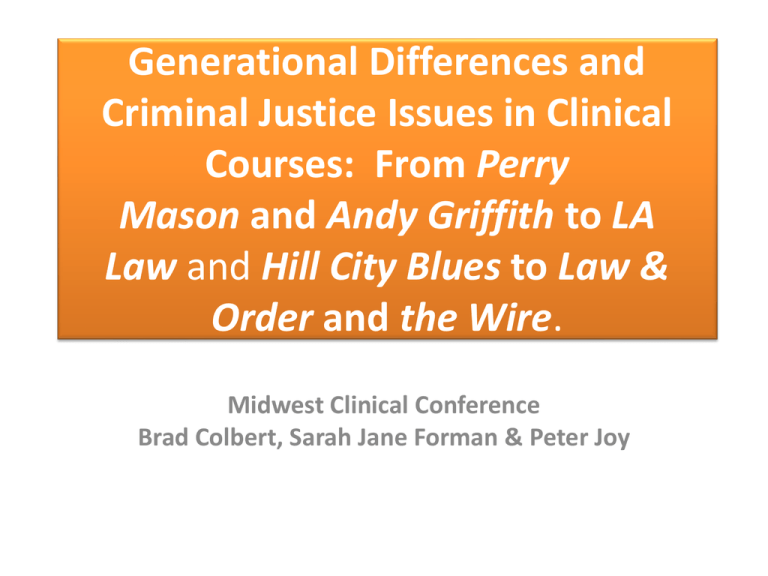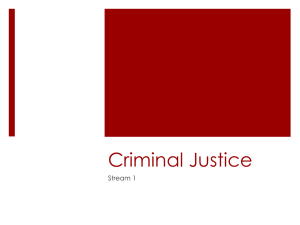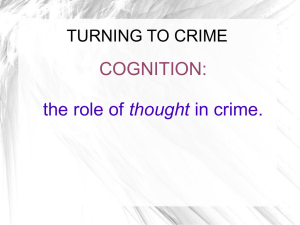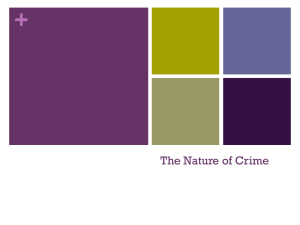Generational Differences and Criminal Justice Issues in Clinical
advertisement

Generational Differences and Criminal Justice Issues in Clinical Courses: From Perry Mason and Andy Griffith to LA Law and Hill City Blues to Law & Order and the Wire. Midwest Clinical Conference Brad Colbert, Sarah Jane Forman & Peter Joy Goals for This Session • 1. How does the media affect our perceptions of the criminal justice system and the actors in it? • 2. Has the media images of the accused, prosecutors, defense lawyers and others in the criminal justice system changed over time? • 3. What does this mean to our teaching? How does the media affect our perceptions of the criminal justice system and the actors in it? • Perceptions of Criminal Justice in the Classroom Do you think the media accurately depicts the criminal justice system? Do you think your students believe that the media accurately depicts the criminal justice system? Do you and your students consume the same mass media? What about the same mass media regarding the criminal justice system? Our Survey • • • • Unscientific, But Informative 10 Questions 111 Responses Before We Sent The Survey To The Clinic Listserve We Added An Additional Question Identifying Clinical Legal Educators Question 1 Question 2 Question 10 Question 10 Question 2 Question 3 Question 4. Which media depiction (TV, Movies, Music, etc.) of lawyers, law enforcement, and criminal justice do you find most relevant? • 21-29 “Actual trials such as the Casey Anthony trial. I also watch Law and Order: SVU on a regular basis as well as Suits and the Newsroom touches on it too somewhat. I think the most relevant is local news coverage of actual events, not scripted ones.” • 30-39 “The Wire because it depicts the social issues that cause crime and it shows how different industries (media, government, etc) play a part in the system as a whole.” 40-49 “I don't think the media depiction of these groups is relevant at all and I try to avoid watching any TV or movies with this content. I try to limit my experiences to real life courtrooms.” • 50-59 “TV, though the accuracy of the depiction has deteriorated across time.” • 60 and older “I watch TV and movies for fun, but not as a source of relevant information. I get the most relevant information from news sources and from scholarly journals.” Question 6 Question 6 Question 7 Question 7 Question 8 Question 8 Question 9 Question 9 Question 11 What is the most compelling media portrayal of a criminal justice related issue that you have seen/read/heard? Why? • • • • • The Wire Law & Order To Kill A Mockingbird The Innocence Project The New Jim Crow: Mass Incarceration in the Age of Colorblindness • • • • • • • • • • • • • • Thank You for Smoking The NY Times coverage of Connick v. Thompson This American Life's "Very Tough Love“ The Amy Senser trial A Time to Kill The Lincoln Lawyer All Good Things The series of reports on Reason.com about both police and prosecutorial conduct The St. Paul Crime Lab story from July The internet portrayal of the Trayvon Martin shooting Rodney King Murder on a Sunday Morning A documentary called Crime After Crime Presumed Innocent • • • • • • • • • • • The Plea My Cousin Vinny Breaker Morant The OJ Case Black & Blue What Jennifer Saw Before Stonewall Criminal Justice (with Forest Whitaker) The Troy Davis Story Rumpole of the Bailey The Street Lawyer Do you think your students come into the clinic with an accurate view of the criminal justice system? Do you think the media is getting better or worse in its portrayal of the criminal justice system? Should we discuss how the media depicts crime and justice in our clinics? If you think this should be discussed, how would you discuss it? What are people doing to address the issue (media/generational differences)?











